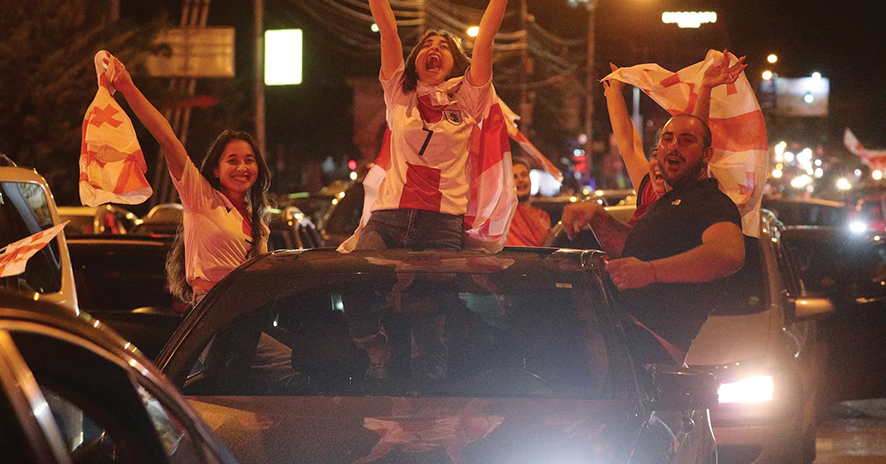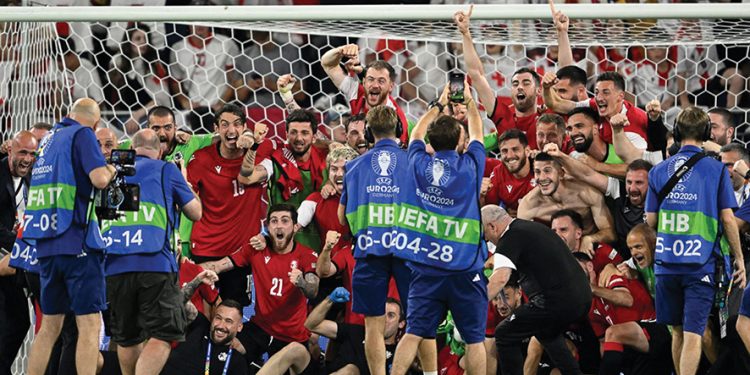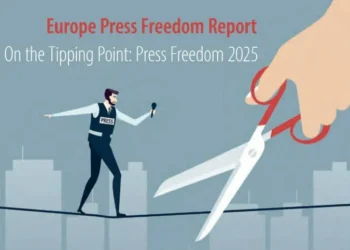ANALYSIS BY ALASTAIR WATT
Georgia entered the unimaginable dreamland of the last 16 of Euro 2024 after a performance for the ages earned them a staggering 2-0 victory over Portugal in Gelsenkirchen on June 26. Exactly three months on from that euphoric triumph against Greece in Tbilisi, the Georgians produced a display that has drawn admiration from all across the football world. The celebratory scenes on the Georgian streets on that famous March night were made to look timid by comparison, as fans partied into the morning all over the country. The feeling of joy and unity was palpable as strangers embraced each other lovingly, car horns tooted incessantly, and even the most reserved Georgians danced jigs of delight, all because of something as simple as a football match.
In the time between that Greece win and this Portugal conquest, Georgia had been hitting the global headlines for less uplifting reasons of course, as protests swept the country for many weeks and images of violence on Tbilisi’s streets became leading stories.
On Wednesday night, the roads were again full of flag-waving Georgians but blissfully there was not a “Robocop” in sight. While Georgians have won gold medals at the Olympics, its rugby team have performed heroics, its basketball side have reached a major tournament, and its MMA fighters have secured prestigious belts, this was surely the country’s most revered sporting moment to date. After all, people here love their football, yet up until now they haven’t been able to take much joy in the national team’s results, with many instead worshiping Barcelona and Real Madrid, or Lionel Messi and Cristiano Ronaldo.
That’s all changed now, as Ronaldo and his fellow Portuguese were vanquished in sensational style at the Ruhr by a Georgian side brimming with bravery, determination, and not a small amount of genuine quality.

Heading into the Portugal clash, Georgia had already gleaned compliments from football experts all over the continent, after a spirited defeat to Turkey in their opening match and a hard-fought draw with Czechia. Managed by Frenchman Willy Sagnol, the Georgians had done themselves proud in those first two matches, but surely Portugal would be the end of their endearing story. It wasn’t. The task for Georgia was straightforward but, in the eyes of most, nearly impossible. To progress, they needed to overcome the might of Portugal, captained by Ronaldo and considered among the favorites for the entire tournament. Even though the Portuguese were already confirmed as group winners and opted to rest some of their stars such as Bruno Fernandes and Bernardo Silva, for Georgia this was a herculean assignment. It was one they tackled with the sort of guts the country’s natives have proudly shown for centuries in all kinds of adversity. Keeping things tight, holding on for maybe one chance, and praying for good fortune – that might have been the presumed strategy. However, less than two minutes into this do-or-die encounter, Georgia had what even their most optimistic supporter can’t have anticipated: an opening goal.
A slack Portuguese pass gifted possession to Giorgi Mikautadze, who’d scored in both of the first two games, and he fed an inch-perfect through ball to Georgia’s superstar Khvicha Kvaratskhelia.
The young man whose number 77 Napoli shirt has become standard issue attire for the nation’s children (and many adults) then advanced with inexplicable composure before powering a left-foot shot past Portuguese goalkeeper Diogo Costa. As the net bulged, a mixture of disbelief and unimaginable delight soared across the stands in Gelsenkirchen, and all over the homeland from the twinkling Black Sea in the west to the semi-desert in the east and every village in between.
No one had truly prepared for this, and now there was another 88 minutes to negotiate. Yet while the heart rates exploded among the supporters, the Georgian players somehow kept their cool and their discipline. Of course, the Portuguese threatened, with Giorgi Mamardashvili, the standout goalkeeper of the championship so far, forced into some customarily excellent saves. But there was a sense of calm about the Georgian rearguard. As Ronaldo squealed in anguish and received a yellow card for his childish histrionics, the likes of Guram Kashia, Lasha Dvali, and Otar Kakabadze exhibited a strength of character that allowed fans to believe that the nearly impossible may actually be possible. After a frenetic first 45 minutes, the half-time whistle gave the Georgian team and its backers a merciful opportunity to breathe and take stock of the magical reality in which they found themselves. If they could hang on for another 45 minutes, history was theirs – an unprecedented place in the knockout stages of an international tournament.
But as it transpired, “hanging on” was not what Georgia did by any means. Indeed, they ought to have doubled their lead in the 50th minute when a cutback found Kvaratskhelia twelve yards from goal, only for the Georgian talisman to misconnect tamely into the arms of Costa. Although that felt like a miss that Georgia would live to rue, they were presented with an even greater opportunity soon after.

Holding a one-goal lead against world-class opponents, quite what defender Luka Lochoshvili was doing anywhere near the Portuguese penalty box is somewhat mystifying – but his bravado was rewarded as he nicked the ball past Antonio Silva whose kick to the shin brought the marauding Georgian to the ground. Eventually, after Mamardashvili had produced yet another breathtaking save at the other end, the referee awarded a deserved penalty to Georgia following a few inspections of the VAR monitor. Up stepped Mikautadze who, with the weight of a nation on his shoulders, coolly struck the ball past the despairing Costa to hand Georgia a priceless two-goal advantage. Once again, euphoria abounded but now the disbelief was replaced with belief. Georgia could do it.
In the remaining half hour or so, despite the occasional scare, the Georgians saw out the match with a scintillating combination of composure and talent to clinch an unthinkable spot in the last 16. There, they’ll face the daunting challenge of Spain in Cologne on June 30, where they’ll have the support of arguably almost every non-Spaniard watching. After all, Georgia is THE story of the tournament so far, and the merits of the country’s seat at this particular European table are in no doubt whatsoever. In fact, Georgia is fittingly playing the role of tamada here, leading the toasts and setting the jubilant mood at this footballing feast in Germany.
By Alastair Watt














